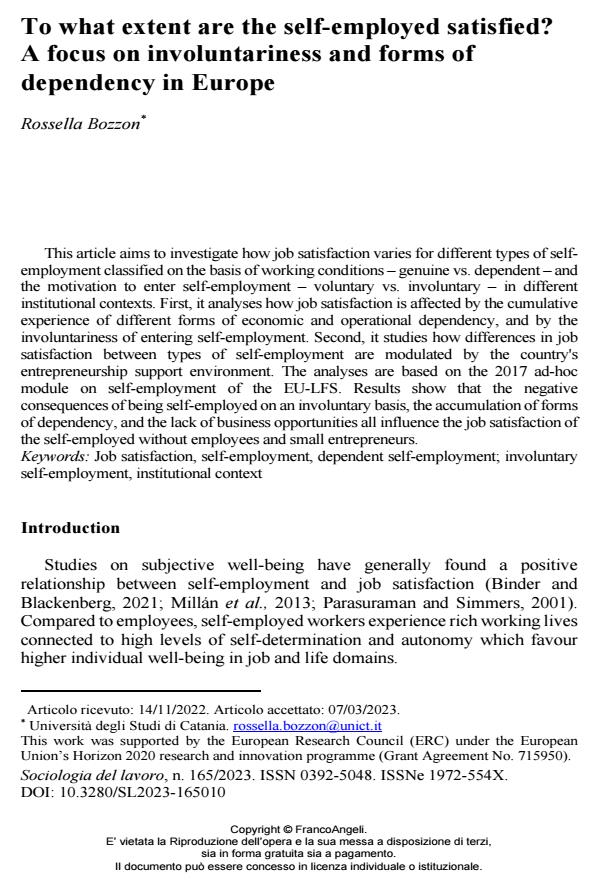To what extent are the self-employed satisfied? A focus on involuntariness and forms of dependency in Europe
Titolo Rivista SOCIOLOGIA DEL LAVORO
Autori/Curatori Rossella Bozzon
Anno di pubblicazione 2023 Fascicolo 2023/165
Lingua Inglese Numero pagine 23 P. 201-223 Dimensione file 330 KB
DOI 10.3280/SL2023-165010
Il DOI è il codice a barre della proprietà intellettuale: per saperne di più
clicca qui
Qui sotto puoi vedere in anteprima la prima pagina di questo articolo.
Se questo articolo ti interessa, lo puoi acquistare (e scaricare in formato pdf) seguendo le facili indicazioni per acquistare il download credit. Acquista Download Credits per scaricare questo Articolo in formato PDF

FrancoAngeli è membro della Publishers International Linking Association, Inc (PILA), associazione indipendente e non profit per facilitare (attraverso i servizi tecnologici implementati da CrossRef.org) l’accesso degli studiosi ai contenuti digitali nelle pubblicazioni professionali e scientifiche.
This article aims to investigate how job satisfaction varies for different types of self-employment classified on the basis of working conditions – genuine vs. dependent – and the motivation to enter self-employment – voluntary vs. involuntary – in different institutional contexts. First, it analyses how job satisfaction is affected by the cumulative experience of different forms of economic and operational dependency, and by the involuntariness of entering self-employment. Second, it studies how differences in job satisfaction between types of self-employment are modulated by the country's entrepreneurship support environment. The analyses are based on the 2017 ad-hoc module on self-employment of the EU-LFS. Results show that the negative consequences of being self-employed on an involuntary basis, the accumulation of forms of dependency, and the lack of business opportunities all influence the job satisfaction of the self-employed without employees and small entrepreneurs.
Questo articolo indaga come la soddisfazione lavorativa varia per diversi tipi di lavoro autonomo in diversi contesti istituzionali in Europa. Innanzitutto, analizza come la soddisfazione lavorativa è influenzata dall'esperienza di diverse forme di dipendenza economica e operativa che contraddistinguono i dependent self-employed e dall'(in)volontarietà d’ingresso nel lavoro indipendente. In secondo luogo, studia come le differenze nei livelli di soddisfazione tra le diverse forme di lavoro autonomo siano influenzate dai livelli di supporto istituzionale alle attività imprenditoriali. Le analisi si basano sul modulo su “Lavoro indipendente” dell'EU-LFS 2017. I risultati mostrano che l’aver intrapreso un’attività autonoma su base involontaria, l'accumulo di forme di dipendenza economica e operativa nello svolgimento del lavoro, e un basso supporto istituzionale all’imprenditorialità influenzano negativamente la soddisfazione lavorativa di lavoratori/trici autonomi/e senza dipendenti e piccoli/e imprenditori/trici, ma non quella di imprenditori/trici medio grandi.
Parole chiave:Soddisfazione lavorativa, lavoro indipendente, dependent self-employment, lavoro autonomo involontario, contesto istituzionale
Rossella Bozzon, To what extent are the self-employed satisfied? A focus on involuntariness and forms of dependency in Europe in "SOCIOLOGIA DEL LAVORO " 165/2023, pp 201-223, DOI: 10.3280/SL2023-165010